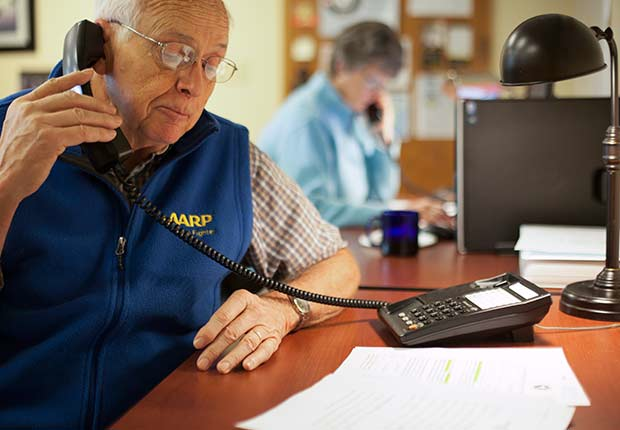AARP Eye Center

By Dana E. Neuts
Last March, Leo Madden, of Seattle, discovered that the IRS had received a tax return from someone claiming to be him, requesting a refund.
Madden, 82, was one of more than 1,000 victims of identity theft whose personal information was stolen from the Seattle Archdiocese in a data breach last spring. The thief did not get a refund but was never identified. Nor was it ever definitively established how the breach occurred.
Madden, who volunteers for the AARP Foundation Fraud Fighter Call Center in Seattle, said he was shocked that this happened.
“I felt violated. Here was somebody who was able to get my information and file a tax return,” he said. “How much more do they know about me? What else have they done with this information?”
Madden is not alone. According to an AARP Fraud Watch Network study, 3 in 10 people surveyed in Washington had been notified in the past 12 months that their personal information might have been compromised, and 1 in 10 reported that someone had used their identity.
Personal information can be obtained in low-tech ways—such as dumpster diving or stealing mail from unlocked mailboxes—and in high-tech ways, including using stolen smartphones and accessing online bank accounts.
Antifraud experts warn that people must be vigilant in protecting their personal information. Putting a passcode on smartphones and computers, for example, is
an easy precaution to keep one’s identity—and money—safe from thieves, who tend to follow the path of least resistance.
“Put up any resistance and there is a good chance you won’t be a victim,” said Doug Shadel, AARP Washington state director and author of the book Outsmarting the Scam Artists: How to Protect Yourself From the Most Clever Cons.
Regularly monitoring bank accounts and credit cards online is also critical. But roughly half of all adults in Washington haven’t set up online access to all of their bank and credit card accounts, the survey showed.
By the time someone receives a paper statement, more fraudulent activity could have occurred, making it more difficult to resolve.
When in doubt, hang up
Another risk of failing to set up online access to accounts is that thieves can do it instead, gaining control of your accounts and access to personal information such as your name, date of birth and Social Security number—all they need to simulate someone’s identity to open new accounts and make purchases.
Fraud center volunteer Ray Powell, 74, of Seattle, cautions people to destroy documents such as preapproved credit card offers and to be wary about sharing information.
“If you didn’t initiate the call, don’t give out your personal information, and if you don’t know where the call is coming from, hang up,” he said.
Madden and Powell volunteer regularly at the Fraud Fighter Call Center, contacting AARP members across the country and providing peer counseling to victims.
In addition to the call center, AARP Washington has partnered with the state attorney general’s office
to host fraud prevention events and launch a statewide media campaign.
AARP Washington hosted more than 65 fraud prevention events around the state in 2014, each with an identity theft component. Similar presentations by volunteer fraud fighters are planned for 2015.
To heighten awareness of how scammers operate outside the public eye, AARP Washington, in cooperation with the King County Prosecuting Attorney’s Office, connected with a local convicted con artist and a fraud victim; their stories were used to tailor AARP’s education efforts to underscore the risks of identity theft.
For suggestions on preventing identity theft, go to the AARP Fraud Watch Network. To learn more about becoming a volunteer fraud fighter, call 800-646-2283 or email waaarp@aarp.org.
Dana E. Neuts is a freelance writer based in Seattle, Wash.























































